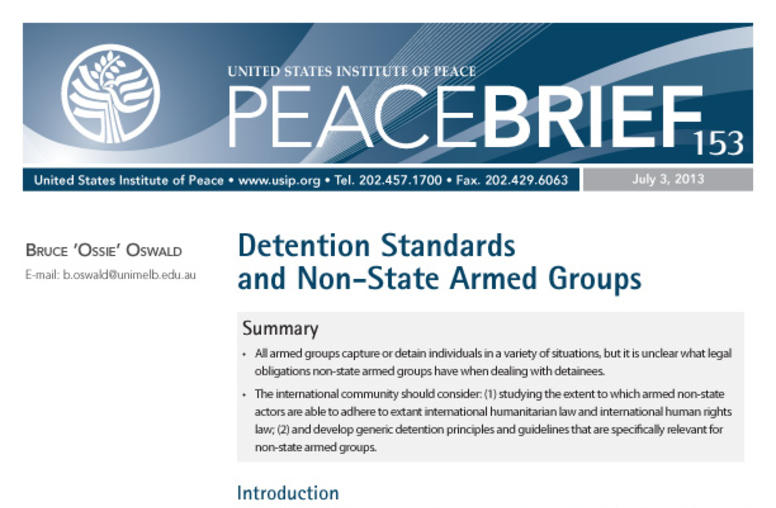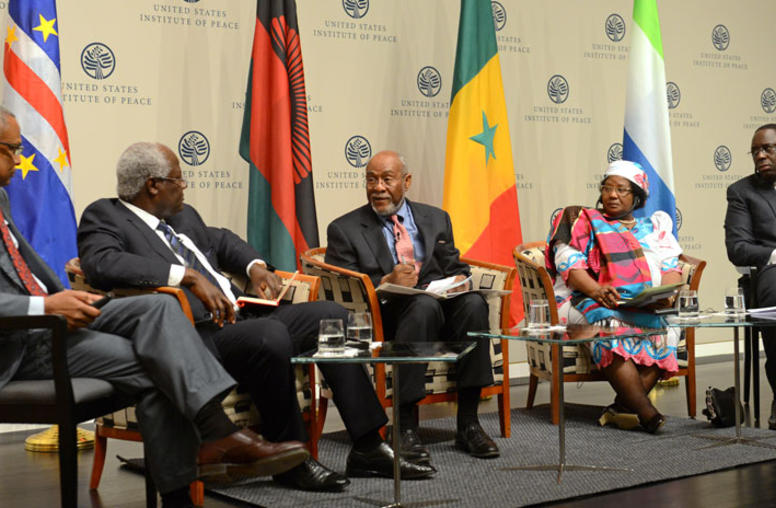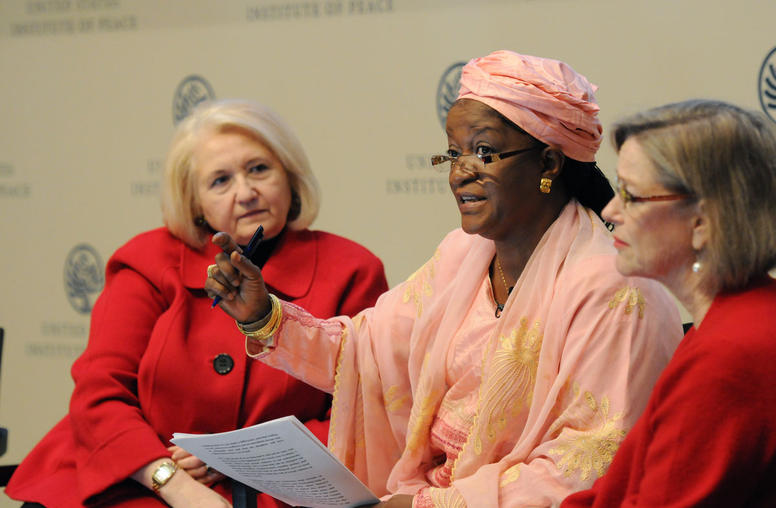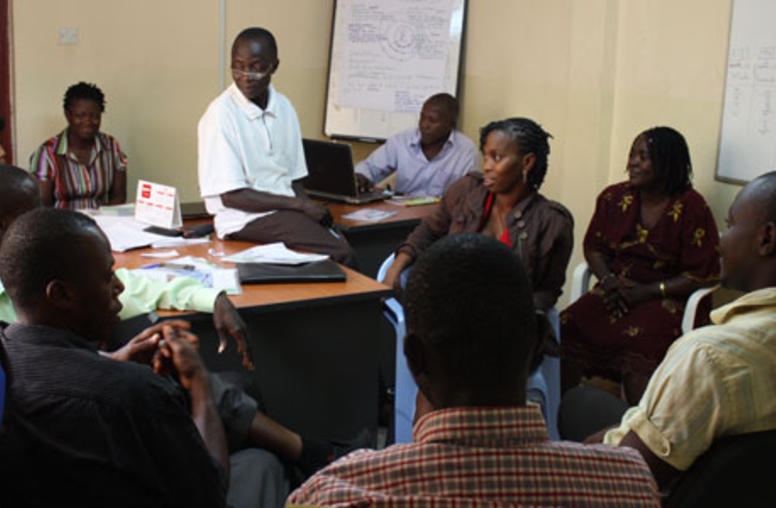Special Court of Sierra Leone Briefing: The Taylor Trial and Lessons from Capacity-Building and Outreach
Against a backdrop of halting progress by many international courts, the Special Court of Sierra Leone (SCSL) has quietly had significant success in accomplishing its mission to provide justice for the perpetrators most responsible for the horrific crimes committed against the people of Sierra Leone.
Against a backdrop of halting progress by many international courts, the Special Court of Sierra Leone (SCSL) has quietly had significant success in accomplishing its mission to provide justice for the perpetrators most responsible for the horrific crimes committed against the people of Sierra Leone. Three years into the Court’s operation, it has achieved guilty verdicts in cases against five defendants—with two verdicts in the past two months—that have set several important precedents in international law. The SCSL has just begun its last and most prominent case with the trial in The Hague of Charles Taylor for his role in fueling the violence in Sierra Leone while he was President of neighboring Liberia. The Taylor trial is expected to end in the fall of 2008, and with that, the Court will begin its wrap-up phase.
The recent verdicts in the AFRC (Armed Forces Revolutionary Council) and CDF (Civil Defense Force) cases underscore the comments Court officials made at the United States Institute of Peace (USIP) during a recent event to discuss new developments in the SCSL. Stephen Rapp, prosecutor of the SCSL, and Herman von Hebel, the Court’s acting registrar, joined Neil Kritz, associate vice president of USIP’s Rule of Law program, to explore the Taylor trial, the Court’s recent precedent-setting convictions, its outreach initiatives, and the additional resources it needs to implement its close-down agenda. They highlighted the progress made courtroom, but also the court’s innovative outreach programs and the need for additional funds to complete its close down plan to solidify the Court’s legacy in contributing to the rule of law in Sierra Leone.
The Special Court’s strategy is to prosecute only high-level crimes…
Stephen Rapp began the discussion by putting the SCSL into context and highlighting the Court’s achievements. The SCSL is a ‘hybrid’ tribunal composed of a majority of international judges and an international prosecutor, but using Sierra Leonean staff and operating under Sierra Leonean law. (Of the 300 staff members of the SCSL, over 50 percent are Sierra Leonean nationals.) Its mandate is limited to prosecution of “persons who bear the greatest responsibility for serious violations of international humanitarian law and Sierra Leonean law committed in the territory of Sierra Leone since November 20, 1996.” The prosecution strategy therefore has been to focus only the top of the power hierarchy that spearheaded the commission of war crimes and crimes against humanity. The first trial began in June 2004 and the Court expects all proceedings to conclude by the end of 2009.
The SCSL is currently prosecuting nine defendants out of a total of thirteen indictees in four separate trials. (Two indictees passed away before trial, one was killed prior to arrest, and one remains at large.) The Court has chosen to focus each trial on a separate set of perpetrators responsible for different aspects of the conflict, including former Liberian president Charles Taylor; members of the CDF, AFRC, and the Revolutionary United Front (RUF).
… including enlisting child soldiers and forced marriage…
The SCSL’s recent judgment in the AFRC case marked the first time that conscription, enlistment and use of child soldiers into an armed conflict was successfully prosecuted as an international crime. The Court’s June 20, 2007 verdict concluded that three senior members of the AFRC were guilty of war crimes and crimes against humanity for their use of child soldiers in their joint campaign with the RUF, which seized control of the Sierra Leonean government in 1997. The AFRC judgment defined conscription, enlistment, or use of child soldiers in an armed force as a crime when (1) the accused conscripted or enlisted one or more persons in armed force or used one or more persons to perpetrate hostilities; (2) such person(s) were under the age of 15 years; (3) the accused knew or should have known that the person(s) were under the age of 15 years; (4) the conduct occurred in the context of and was associated with an armed conflict; and (5) the accused was aware of factual circumstances that demonstrated the existence of an armed conflict.
The June 20, 2007 decision also marked the first time that an international tribunal ruled on the crime of forced marriage in an armed conflict, holding that forced marriages to combatants is illegal as an element of sexual slavery. (On July 19, 2007, the SCSL sentenced the former AFRC members to lengthy prison terms of 45 to 50 years.) On August 2, 2007, the SCSL expanded on its precedent relating to the recruitment of child soldiers by also convicting Allieu Kondewa of the CDF on that charge. Taken together, these recent judgments demonstrate that in addition to providing individual accountability for a portion of the gross atrocities that occurred during the civil war, the SCSL is also pushing forward international criminal jurisprudence to explicitly include the types of extreme violations that have occurred recently in several African wars.
… and the indictment and prosecution of a sitting head of state.
Charles Taylor became a key figure in the Sierra Leon civil war – and its atrocities – when he allegedly financed and trained the AFRC and RUF rebel groups in exchange for Sierra Leonean diamonds. The SCSL indicted Taylor on March 17, 2003 while Taylor was still the sitting President of Liberia, accusing him of war crimes, crimes against humanity, sexual slavery, conscripting child soldiers, and a host of other serious violations of international humanitarian law. This marked the second time (after Slobodan Milosevic) that a sitting head of state had been indicted for international crimes. The indictment was kept under seal until June 4, 2003, when Taylor made his first trip out of Liberia since the indictment was issued. Taylor was apprehended in Nigeria and transferred on March 29, 2006 into the custody of the SCSL.
After his arrest, the Sierra Leonean government decided that Taylor’s presence in the country would be a significant threat to national stability. Therefore, by a special agreement enacted in United Nations Security Council Resolution 1699 (2006), the trial is taking place in the premises of the International Criminal Court in The Hague. Although the venue has changed, the SCSL maintains exclusive jurisdiction over the case, and provides all operations and funding related to the trial.
The Taylor trial officially began on June 4, 2007, but the proceedings have been delayed to give Taylor’s court appointed counsel time to prepare his defense. Taylor has claimed indigence – despite widely rumored wealth from the illicit diamond trade – and has been given court-appointed counsel (with an estimated price tag of $2 million over the course of the trial). Taylor has also threatened to boycott his trial in an apparent bid to delay the proceedings. But Rapp explained that as long as his defense is present before the Court, the SCSL Rules of Procedure do not require Taylor’s attendance, and he expects the testimony to proceed with or without him.
Rapp mentioned that lessons have been learned from the International Criminal Tribunal for the Former Yugoslavia’s (ICTY) prosecution of Slobodan Milosevic, which set the precedent for prosecuting a former head of state. Milosevic’s four year trial, which ended in Milosevic’s death rather than a verdict, underscores the need for a speedy trial. With this lesson in mind, the SCSL aims to finish the Taylor trial by December 2008, issue a judgment by mid-2009, and complete all appeals by the end of 2009. The SCSL also appointed an alternate judge to sit in on all proceedings in order to step in without losing time in the case that a sitting judge must step down, which had significantly delayed the Milosevic trial before.
Precedent also Set Through Innovative Outreach
Herman Von Hebel noted that the Taylor trial presents a special challenge for outreach, which has been an important priority of the SCSL since its inception. To ensure Sierra Leoneans are able to follow the Taylor trial proceedings, the Court has teamed up with the BBC World Service Trust and Search for Common Ground to enable local media to travel to The Hague to cover the trial for a few weeks, and then they return to their country to broadcast their observations. The SCSL will also bring members of civil society from Sierra Leone and Liberia to observe the Taylor trial firsthand, who then report back to their organizations and spread the word about the proceedings.
Once the trial begins, the Court will transmit the proceedings in The Hague to Freetown via video link and the Internet, with summaries of the testimony distributed via DVD media throughout Sierra Leone and Liberia. Most of the outreach currently focuses on Sierra Leone, but von Hebel said the SCSL aims to expand its message to Liberia and Guinea because of the relevancy of the Taylor trial to the people in those countries. Moreover, plans are underway to translate summaries of the proceedings into various local dialects to make the trial accessible to the entire francophone West African region.
The SCSL’s extensive efforts to enable the local population to understand and follow the complexities of the Taylor trial underline the extraordinary outreach effort the Court has taken throughout its operation, making it a model for other hybrid and international courts. This outreach effort is in part a response to the significant accusations that the International Criminal Tribunals in Yugoslavia and Rwanda were too distant from the people affected by the crimes they prosecute to have an impact on national reconciliation. Von Hebel explained that the SCSL’s goal has first been to communicate with the people of Sierra Leone about the affairs of the Court and involve them to the greatest extent possible in the Court proceedings.
According to von Hebel, targets of the SCSL outreach program include the general population and specific groups such as the military, police, students, members of the judiciary, prison officers, religious leaders, and national and international non-governmental organizations. The program includes training programs, town hall meetings, school meetings, seminars, radio programs, and video screenings of trials. In more isolated communities that lack communications infrastructure, the SCSL sends outreach officers, based in Freetown, out to the communities on motorbike to meet with the people and discuss the Court. Extensive information sessions sought to inform the people in rural areas about the Court’s existence and functions.
Von Hebel described one particularly successful effort to teach youth about the importance of the trials in high schools nationwide. Speaking to a crowd of 500 students about the recent cases, Court officials emphasized that the students should go home and tell their parents and two friends about what they heard about the importance of the trials and the rule of law. In that way, von Hebel explained, a presentation to 500 expands the message to 2500, and instills a sense of the importance of justice in the next generation.
Proof of the outreach program’s effectiveness is found in a recent survey of the people of Sierra Leone that found surprisingly strong knowledge and approval of the peace and reconciliation process, including the Court itself. According to the survey, 79 percent of all respondents indicated that they understood the role of the Court and 91 percent indicated that they strongly agreed that the Court contributed to the building of peace after intense violence. 85 percent of respondents indicated that they can speak adequately on the activities of the Court and 88 percent affirmed that the outreach program was doing its job well.
The Legacy of the Special Court for Sierra Leone
As the last of the SCSL’s cases begins, the Court has begun to plan for its close-down and to contemplate its legacy. The Court has recently completed a comprehensive close down plan that projects its costs through the end of its mandate in 2009. The SCSL will exhaust its current funding by approximately November 2007, and still needs $89 million to conclude its operations – $36 million for 2007, $33 million for 2008, and $20 million for 2009. In addition, the SCSL needs international support to carry out sentences and provide witness protection. Lastly, the SCSL needs support for its legacy projects. The Court is currently seeking additional donor contributions to fill this shortfall, which von Hebel explained will enable it to make good on the promising impact the Court has made to date.
Rapp and von Hebel closed by speaking about the milestones the SCSL has reached and their outlook on the Court’s impact and legacy:
- The SCSL’s successful prosecutions of several key leaders of the violence from different factions has played a vital role in fighting against impunity and established a precedent of accountability for individuals who hold the greatest responsibility for fomenting the civil war.
- The Court has improved the capacity of the domestic legal system by employing and training local legal staff and judges, as well as setting an example for exercising fair trial standards in the prosecution of high profile crimes.
- The SCSL witness protection program is a first in the country, which includes physical protection and relocation as well as psychological counseling for traumatized victims. This program provides a model to protect future witnesses in politically charged cases.
- The SCSL’s high-tech court facilities are a model for the region and pending the outcome of negotiations may be available for use by regional institutions like the appeals chamber for the Economic Community of West African States (ECOWAS).
Conclusion
Putting the entire work of the Court into context, von Hebel explained that the SCSL provides a model of a functioning judiciary for the domestic legal system in Sierra Leone. After the Court adjourns, the domestic courts hopefully will be able to pick up where the SCSL left off, using similar procedures and safeguards, to prosecute some of the perpetrators of crimes from the war who had less responsibility and thus fall outside the mandate of the SCSL. Rapp added that in the wake of a conflict that lasted for nearly a decade and greatly impacted the country, the SCSL holds criminals from the conflict accountable and sends the message that nobody is above the law. Both portrayed the SCSL as playing a vital role in transitioning to a peaceful and just society.
This USIPeace Briefing was written by Scott Worden, advisor, and Emily Wann, a research assistant, both in the Rule of Law program at the U.S. Institute of Peace. The views expressed here are not necessarily those of the Institute, which does not advocate specific policies.
The United States Institute of Peace is an independent, nonpartisan institution established and funded by Congress. Its goals are to help prevent and resolve violent international conflicts, promote post-conflict stability and development, and increase conflict management capacity, tools, and intellectual capital worldwide. The Institute does this by empowering others with knowledge, skills, and resources, as well as by directly engaging in peacebuilding efforts around the globe.



